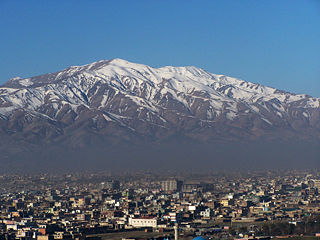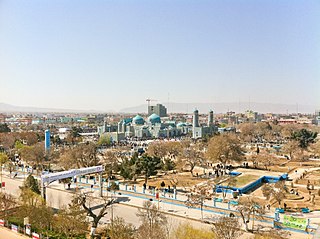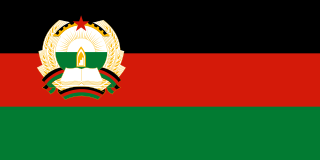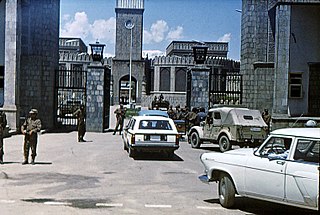Related Research Articles

Afghanistan,officially the Islamic Emirate of Afghanistan,is a landlocked country located at the crossroads of Central Asia and South Asia. Referred to as the Heart of Asia,it is bordered by Pakistan to the east and south,Iran to the west,Turkmenistan to the northwest,Uzbekistan to the north,Tajikistan to the northeast,and China to the northeast and east. Occupying 652,864 square kilometres (252,072 sq mi) of land,the country is predominantly mountainous with plains in the north and the southwest,which are separated by the Hindu Kush mountain range. Kabul is the country's largest city and serves as its capital. As of 2021,Afghanistan's population is 40.2 million,composed of ethnic Pashtuns,Tajiks,Hazaras,Uzbeks,Turkmens,Qizilbash,Aimak,Pashayi,Baloch,Pamiris,Nuristanis,and others.

The Hazaras are an ethnic group and a principal component of the population of Afghanistan,native to,and primarily residing in the Hazaristan region in central Afghanistan and the northern regions of the Baluchistan province in Pakistan. They are one of the largest ethnic groups in Afghanistan,and a significant minority group in Pakistan,mostly in Quetta,and as well as in Iran. They speak the Dari and Hazaragi dialects of Persian. Dari,one of the two official languages in Afghanistan.

Kabul is the capital and largest city of Afghanistan. Located in the eastern half of the country,it is also a municipality,forming part of the Kabul Province;it is administratively divided into 22 municipal districts. According to late 2022 estimates,the population of Kabul was 3.5 million people. In contemporary times,the city has served as Afghanistan's political,cultural,and economical centre,and rapid urbanisation has made Kabul the 75th-largest city in the world and the country's primate city.

Kandahar is a city in Afghanistan,located in the south of the country on the Arghandab River,at an elevation of 1,010 m (3,310 ft). It is Afghanistan's second largest city after Kabul,with a population of about 614,118. It is the capital of Kandahar Province as well as the headquarters of the Taliban,formally known as the Islamic Emirate of Afghanistan. It is also the centre of the larger cultural region called Loy Kandahar.

Mazar-i-Sharīf,also known as Mazar-e Sharīf or simply Mazar,is the fourth-largest city in Afghanistan by population,with an estimated 500,207 residents in 2021. It is the capital of Balkh province and is linked by highways with Kunduz in the east,Kabul in the southeast,Herat in the southwest and Termez,Uzbekistan in the north. It is about 55 km (34 mi) from the Uzbek border. The city is also a tourist attraction because of its famous shrines as well as the Islamic and Hellenistic archeological sites. The ancient city of Balkh is also nearby.

The Taliban,which also refers to itself by its state name,the Islamic Emirate of Afghanistan,is a Deobandi Islamic fundamentalist and Pashtun nationalist militant political movement in Afghanistan. It ruled approximately three-quarters of the country from 1996 to 2001,before being overthrown following the United States invasion. It recaptured Kabul on 15 August 2021 after nearly 20 years of insurgency,and currently controls all of the country,although its government has not yet been recognized by any country. The Taliban government has been criticized for restricting human rights in Afghanistan,including the right of women and girls to work and to have an education.

Pashtuns,also known as Pakhtuns or Pathans,are an Eastern Iranian ethnic group historically native to the Pashtunistan region of southern Afghanistan and northwestern Pakistan. They historically were also referred to as Afghans until the 1970s,after the term's meaning had become a demonym for members of all ethnic groups in Afghanistan.

Dari,also known as Dari Persian,is the variety of the Persian language spoken in Afghanistan. Dari is the term officially recognised and promoted since 1964 by the Afghan government for the Persian language,hence it is known as Afghan Persian or Eastern Persian in many Western sources. As Professor Nile Green remarks "the impulses behind renaming of Afghan Persian as Dari were more nationalistic than linguistic" in order to create an Afghan state narrative. Apart from a few basics of vocabulary,there is little difference between formal written Persian of Afghanistan and Iran. The term "Dari" is officially used for the characteristic spoken Persian of Afghanistan,but is best restricted to formal spoken registers. Persian-speakers in Afghanistan still prefer to call their language “Farsi,”while Pashto-speakers may sometimes refer to it as "Parsi." Farsi Dari serves as the lingua franca for interethnic communications in Afghanistan.

The Democratic Republic of Afghanistan (DRA),renamed the Republic of Afghanistan in 1987,was the Afghan state during the one-party rule of the People's Democratic Party of Afghanistan (PDPA) from 1978 to 1992. It relied heavily on assistance from the Soviet Union for most of its existence,especially during the Soviet–Afghan War.

The Soviet–Afghan War was a protracted armed conflict fought in the Democratic Republic of Afghanistan from 1979 to 1989. It saw extensive fighting between the Soviet Union,the DRA and allied paramilitary groups against the Afghan mujahideen,foreign fighters,and smaller groups of anti-Soviet Maoists.

Gulbuddin Hekmatyar is an Afghan politician,former mujahideen leader and drug trafficker. He is the founder and current leader of the Hezb-e-Islami Gulbuddin political party,so called after Mohammad Yunus Khalis split from Hezbi Islami in 1979 to found Hezb-i Islami Khalis. He has twice served as Prime Minister during the 1990s.

The national flag of the Islamic Emirate of Afghanistan,also used as the flag of the Taliban,consists of a white field with a black Shahada. It was adopted on 15 August 2021 with the victory of the Taliban in the 2001–2021 war. Since the Anglo-Afghan War of 1919,also known as the War of Independence,Afghanistan has used about 19 national flags,more than any other country in this period. The national flag had black,red and green colors most of the time during the period.

Helmand,also known as Hillmand,in ancient times,as Hermand and Hethumand,is one of the 34 provinces of Afghanistan,in the south of the country. It is the largest province by area,covering 58,584 square kilometres (20,000 sq mi) area. The province contains 13 districts,encompassing over 1,000 villages,and roughly 1,446,230 settled people. Lashkargah serves as the provincial capital. Helmand was part of the Greater Kandahar region until made into a separate province by the Afghan government in the 20th century.

The Northern Alliance,officially known as the United Islamic National Front for the Salvation of Afghanistan,was a military alliance of groups that operated between late 1996 to 2001 after the Islamic Emirate of Afghanistan (Taliban) took over Kabul. The United Front was originally assembled by key leaders of the Islamic State of Afghanistan,particularly president Burhanuddin Rabbani and former Defense Minister Ahmad Shah Massoud. Initially it included mostly Tajiks but by 2000,leaders of other ethnic groups had joined the Northern Alliance. This included Karim Khalili,Abdul Rashid Dostum,Abdullah Abdullah,Mohammad Mohaqiq,Abdul Qadir,Asif Mohseni,Amrullah Saleh and others.

The 1989–1992 Afghan Civil War took place between the Soviet withdrawal from Afghanistan on 15 February 1989 until 27 April 1992,the day after the proclamation of the Peshawar Accords proclaiming a new interim Afghan government which was supposed to start serving on 28 April 1992.

The Saur Revolution or Sowr Revolution,also known as the April Revolution or the April Coup,was staged on 27–28 April 1978 by the People's Democratic Party of Afghanistan (PDPA) and overthrew Afghan president Mohammed Daoud Khan,who had himself taken power in the 1973 Afghan coup d'état and established an autocratic one-party system in the country. Daoud and most of his family were executed at the Arg in the capital city of Kabul by PDPA-affiliated military officers,after which his supporters were also purged and killed. The successful PDPA uprising resulted in the creation of a socialist Afghan government that was closely aligned with the Soviet Union,with Nur Muhammad Taraki serving as the PDPA's General Secretary of the Revolutionary Council. Saur or Sowr is the Dari-language name for the second month of the Solar Hijri calendar,during which the events took place.

The Pakistani Taliban,formally called the Tehreek-e-Taliban-e-Pakistan,is an umbrella organization of various Islamist armed militant groups operating along the Afghan–Pakistani border. Formed in 2007 by Baitullah Mehsud,its current leader is Noor Wali Mehsud,who has publicly pledged allegiance to the Afghan Taliban. The Pakistani Taliban share a common ideology with the Afghan Taliban and have assisted them in the 2001–2021 war,but the two groups have separate operation and command structures.

The War in Afghanistan was an armed conflict from 2001 to 2021. It began when an international military coalition led by the United States launched an invasion on Afghanistan,toppling the Taliban-ruled Islamic Emirate and establishing the internationally recognized Islamic Republic three years later. The conflict ultimately ended with the 2021 Taliban offensive,which overthrew the Islamic Republic,and re-established the Islamic Emirate. It was the longest war in the military history of the United States,surpassing the length of the Vietnam War (1955–1975) by approximately 6 months.

The Afghanistan conflict is a series of events and wars that have kept Afghanistan in a continuous state of armed conflict since 1978. The country's instability began during the time of the Republic of Afghanistan in the 1970s,which had been established following the collapse of the Kingdom of Afghanistan in the 1973 coup d'état;with the overthrow of Afghan monarch Mohammed Zahir Shah,who reigned for almost forty years,Afghanistan’s relatively peaceful period in modern history came to an end. The triggering event for the ongoing Afghanistan conflict was the Saur Revolution of 1978,which overthrew the Republic of Afghanistan and established the Democratic Republic of Afghanistan. Rampant post-revolution fighting across the country ultimately led to a pro-government military intervention by the Soviet Union,sparking the Soviet–Afghan War in the 1980s.
The Islamic State–Taliban conflict is an ongoing armed conflict between the Islamic State and the Taliban in Afghanistan. The conflict escalated when militants who were affiliated with Islamic State –Khorasan Province killed Abdul Ghani,a senior Taliban commander in Logar province on 2 February 2015. Since then,the Taliban and IS-KP have engaged in clashes over the control of territory,mostly in eastern Afghanistan,but clashes have also occurred between the Taliban and IS-KP cells which are located in the north-west and south-west.
References
- ↑ Malalai Joya. A Woman Among Warlords: The Extraordinary Story of an Afghan Who Dared to Raise Her Voice . Simon and Schuster, 2009. ISBN 1-4391-0946-X, 9781439109465